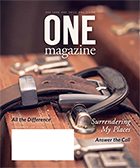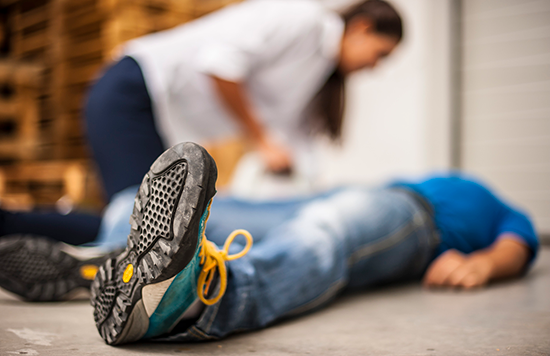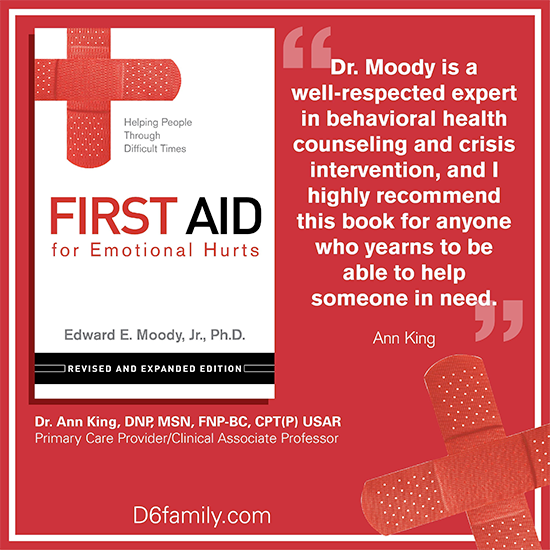
June-July 2018
Surrendering
My Places
------------------
|






Answer the Call
By Edward W. Moody, Jr.
On May 9, 2015, Jeng Yoong Tan went into cardiac arrest at a Lone Star restaurant in Clayton, North Carolina. Every year 350,000 people in the United States go into cardiac arrest outside of a hospital and 90% of them die. My friend’s life was saved that day because someone knew first aid and was willing to take time to help him. It is important to know and administer physical first aid.
We also need to be capable of administering another type of first aid, and that is first aid for emotional needs. Emotional needs arise after someone experiences a loss or struggles with a mental illness or some type of substance.
You are much more likely to encounter someone who needs emotional first aid since one in four Americans will experience a mental health problem or abuse substances at some point in their lifetimes. In fact, 44 million Americans aged 12 and older have experienced a mental health problem. So, you are 125 times more likely to encounter someone depressed, addicted, or traumatized than you are someone who will go into cardiac arrest. Therefore, we would do well to become equipped in the techniques needed to help people with these difficulties.
Too often we think these problems are the domain of the helping professional. But that would be a bit like being in a restaurant when someone goes into cardiac arrest, and saying, “You know, I’d love to help but I am not a doctor or a nurse.” That response would be ludicrous, since the person only needs first aid that any equipped person could have provided.
Similarly, those we encounter with emotional difficulties do not always need a psychologist, counselor, or even a pastor. They simply need a friend, family member, or fellow congregant to be equipped to provide aid to them. This is the point of the story Jesus told of the Good Samaritan where He described what a real neighbor (or friend or Christian) is really supposed to be like. After Jesus told the story, he commanded believers to go and do likewise (Luke 10:37). This willingness to serve was what Paul was getting at when he said Christians are called to be ambassadors for Christ (2 Corinthians 5:20). And remember, Jesus called the hurting to come to Him (Matthew 8:38) when they needed rest. But where are they to go? Well, they are to go to you (if you are a Christian). You are the hands and feet of Christ (1 Corinthians 12:27), and you are called to render aid to hurting people (Matthew 25:35-40). But how can we do this?

I am glad you asked! For years, I have worked to prepare others to help people in need. In the revised version of First Aid for Emotional Hurts, we describe how any Christian can use the tools God has given them to help the hurting. Then we describe the techniques that can be used. Helping other people can be complicated, and it involves being prepared and willing to do what God has called all of us to do. In the remainder of the book, we provide a brief overview of the problems people face while exploring how to use these tools and techniques to help with these issues.
I know everyone does not want to become an expert in grief, depression, or addictions, so the book provides the readers a simple overview of these problems so you will have a general idea of what to do should you encounter someone with these problems.
Many of us have a first aid kit in our car or homes, which contains bandages or medicine for specific physical problems one can experience. Randall House has put together an emotional first aid kit with booklets and videos that provide more information about these issues. A brief description of each is provided here.
-
Getting Help is about how the helping process works and the way to find the particular helping professional needed.
-
Grief describes the physical, psychological, social, and spiritual impact of a loss. Myths that often haunt grieving Christians are dispelled and a biblical model for grieving is provided.
-
Depression describes the types and nature of depression, as well as what an individual can do to find their way out of the valley of depression.
-
Addiction describes the nature of entangling behaviors and a step-by-step biblical process out that ends with a plan for avoiding relapse.
-
Sexual Issues describes the range of sexual sins in which one can become entangled and how to break the chain of sexual sin.
-
The booklet on Veterans was written with Lt. Col. David Trogdon and can be used to help veterans and their families recover from the impact of war.
-
Helping Children with Emotional Problems describes how parents and caretakers can intervene with their children and get at the root of emotional issues. Special attention is given to helping children who struggle with depression, anxiety, and eating disorders.
-
Helping Children with Learning Problems describes how parents and caretakers can help children who struggle with a learning disability and attention deficit hyperactivity disorder.
-
First Aid for Marriage provides practical instruction for marital difficulties including dealing with affairs and domestic violence.
-
Therapeutic Life Changes is an uplifting book describing how our faith can have a positive impact upon our health.
First Aid for Emotional Hurts provides you with the basic skills you need to help someone experiencing
a particular difficulty. The booklets allow you to go
into greater depth on an issue, and you can give the booklet to someone who is struggling with the particular problem.
Often, I look at my friend Jeng Yoong and marvel at how he is still with us simply because someone administered first aid to him. I pray you may be able to use these resources to administer emotional first aid to people who will later marvel at what they become by the grace of God.
About the Writer: Dr. Eddie Moody is a pastor, professor, and parent. He is the author of the First Aid for Your Emotional Hurts booklet series. For more information visit RandallHouse.com.
|
|

